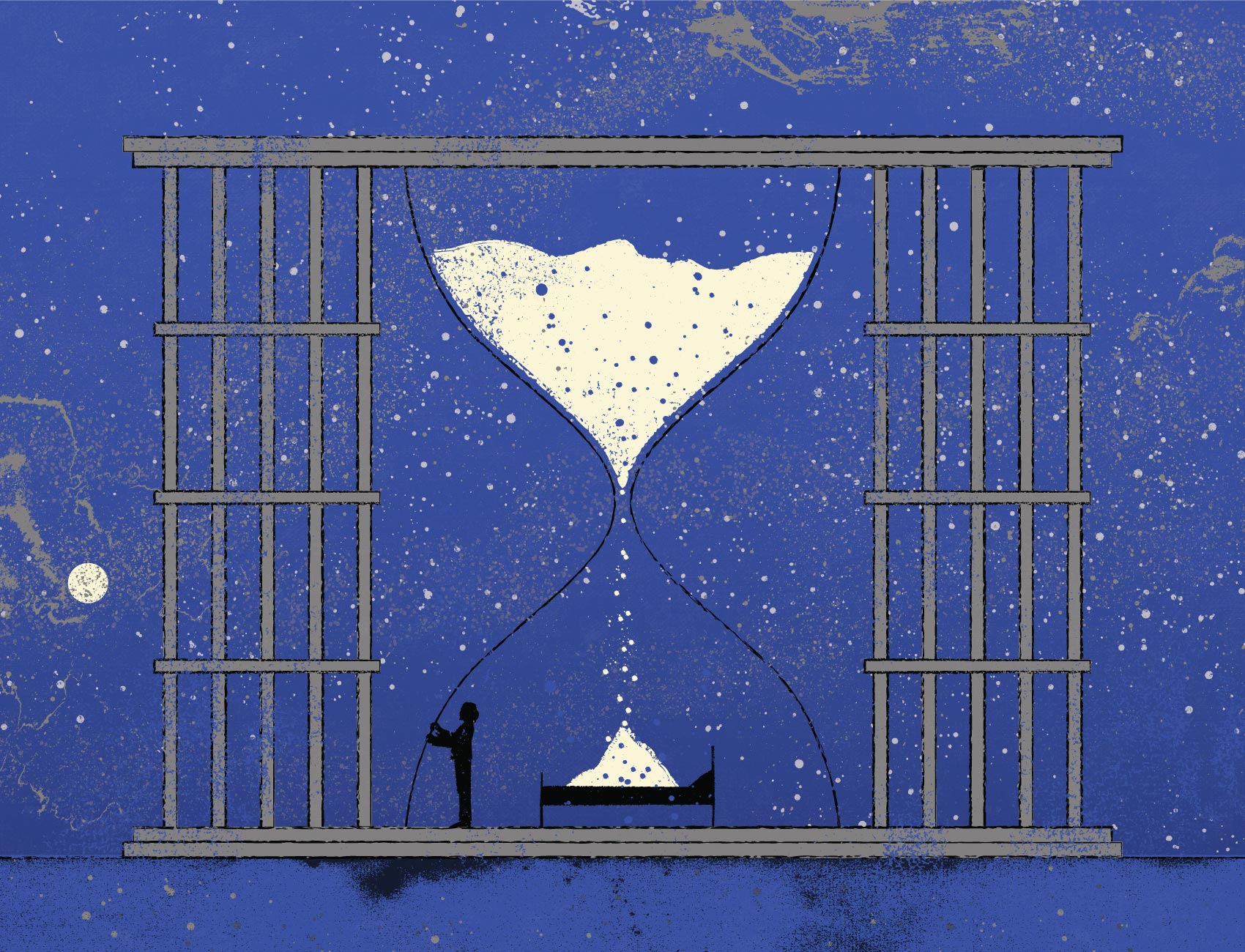An Indiana Woman’s Long Fight for Justice
In a rare move, a federal court vacated Anastazia Schmid’s murder conviction, saying she’d received ineffective assistance of counsel and had been mentally unfit to stand trial. But Schmid, who’d spent 18 years in prison, remained locked up for three months more.

Anastazia Schmid is not clear what happened on the night she killed her boyfriend.
According to court documents—compiled from testimony from her mother, brother, and psychiatrists Schmid spoke with—she and her boyfriend, Tony Heathcote, were having sex on March 4, 2001, using restraints and a blindfold, when Heathcote suggested that they role play, with Schmid pretending to be a little girl and Heathcote the father. Two days earlier, according to court documents, Schmid had learned that Heathcote had allegedly molested her 6-year-old daughter.
That night, Schmid heard a voice telling her that she was the messiah, and that Heathcote was evil and needed to be eliminated. She stabbed him 39 times, and he died. Police in Tippecanoe County, Indiana, arrested her; she was charged with murder.
“I was in a dissociative episode at the time,” Schmid told The Appeal in a July phone call from prison. “My memory to this day is very fragmented of exactly what happened that night.”
Schmid has a history of auditory and visual hallucinations that began at the age of 5, according to three psychiatrists who testified at her September 2002 trial. She has suffered from dissociative disorder and bipolar disorder and has been hospitalized for psychiatric reasons several times throughout her life. She is also a survivor: Heathcote subjected her “to years of rape and physical and psychological abuse,” per a court filing and Schmid’s own account.
Schmid had spent 18 years in prison for the murder when, in May, a federal court found that she was mentally unfit to have stood trial and did not receive effective assistance of counsel, a violation of her Sixth Amendment rights. The court vacated her conviction and ordered her immediate release.
But prison officials held her for three months more. Tippecanoe County Prosecutor Patrick Harrington’s office issued a warrant that Schmid be held without bond while the state made plans to file an appeal. It was not until Schmid agreed to plead guilty to voluntary manslaughter and a sentence of time served plus two years of parole that the state agreed to release her.
“I just wanted the pain and harm to stop, not just for me, but for my family and his family,” Schmid, now 45, told The Appeal on Tuesday, one week after being released. Pleading guilty and avoiding another trial “was the best way to make this happen as quickly as possible.
Competency questions
About four months after her arrest, Schmid was deemed incompetent to stand trial. She was transferred to the state hospital, the first of several transfers from the Tippecanoe County jail, in Lafayette, Indiana.
In January 2002, her attorneys filed a second motion to determine competency. Schmid had been experiencing hallucinations and, in the words of her attorney, “going backwards again.” The court-appointed doctors found her competent, but the court never made a competency determination.
During the next eight months, Schmid was transferred several times to Wabash Valley Hospital to be evaluated and have her medications adjusted. In the weeks leading up to her September trial, she was on a daily dosage of eight psychiatric medications.
By August, Schmid’s mental state and the medications made it impossible for her attorney to communicate with her, but he did not request a new competency hearing. The judge then issued an order finding Schmid competent, and the trial proceeded.
In the weeks leading up to her September trial, she was on a daily dosage of eight psychiatric medications.
At her September trial, three psychiatrists testified to Schmid’s history of mental illness. One doctor, Mukesh Desai, said that, at the time of her boyfriend’s death, she “was not able to appreciate the nature and quality of her act.” The other two psychiatrists diagnosed Schmid with schizoaffective disorder, and both found that she was insane at the time of the killing.
Two days into her trial, the prosecutor approached Schmid’s then-attorney David Hennessy to discuss the possibility of a plea bargain in which Schmid would plead guilty to reckless homicide in exchange for an eight-year sentence. But Hennessy never told Schmid about the plea offer.
A day later, Hennessy and his co-counsel, Amy Hutchinson, told the judge about their increasing concerns about Schmid’s mental state and ability to participate in her defense, noting that she was shaking, hearing voices, and fixating her eyes on one spot. The judge asked if Schmid was “aware enough to let you know when she’s having a problem or does someone have to observe her and let us know?” Hutchinson told the judge that she believed Schmid was capable of alerting her if she was having a problem. Without further inquiry, the trial continued.
After a six-day trial, the jury found Schmid “guilty but mentally ill”—a verdict that, in Indiana, requires mental illness treatment and evaluation while incarcerated but does not necessarily protect against harsh sentences. Indeed, Schmid was sentenced for murder to 55 years in prison with the final five years suspended.
When asked at a 2011 post-conviction evidentiary hearing about Schmid’s competency during the trial, Hennessy said, “I think she could understand what you’re saying but she was heavily medicated and it—I don’t know almost like being immobilized.”
The ineffective counsel issue
“When a defendant goes into the criminal legal system, they are coming up against all the resources that the government can bring to bear,” noted Cindene Pezzell, legal coordinator for the National Clearinghouse for the Defense of Battered Women. “Having an effective attorney is what we have in place to balance the playing field.”
Attorneys must understand what tools—including counseling, therapy, or finding an expert witness skilled at asking trauma-informed questions—are necessary in cases like Schmid’s, Pezzell told The Appeal. But “people need to be competent to proceed [in their court cases], and it’s the lawyer’s job to make that happen,” she added.
Still, court decisions granting relief based on ineffective counsel are rare. A 2007 study found that ineffective assistance of counsel claims were successful in fewer than 7 percent of federal habeas petitions in capital cases (14 granted out of 214 filed). Another study of appeals filed by people who were later exonerated by DNA evidence found that less than 11 percent of ineffective assistance of counsel claims were upheld.
In its 1984 decision in Strickland v. Washington, the U.S. Supreme Court established a two-prong test for determining when ineffective counsel violated a person’s Sixth Amendment right to counsel. The first prong requires proving that counsel was ineffective, a test which Pezzell described as “a tough hill to climb.” Once that proof is met, the defendant must then show that the ineffectiveness had a detrimental outcome. “That’s even harder because courts view that as speculative,” Pezzell noted. “They can say, ‘Maybe if the jury heard all of these things that would have been better for your case,’ but it wouldn’t necessarily have impacted the outcome.”
Freedom delayed
Schmid, however, prevailed on her ineffective counsel complaint. But the decision by the U.S. District Court for the Southern District of Indiana to vacate her conviction contained a caveat: It ordered that Schmid be immediately released—unless the state elected to retry her within 120 days of the judgment.
Harrington’s office issued a warrant instructing the prison to hold Schmid without bond until it could re-try her. His office did not respond to The Appeal’s request for comment.
The injury inflicted on Anastazia Schmid by further detention … is without question irreparable.
Joshua T. Wackerly Schmid’s attorney
The state attorney general’s office also announced its intention to appeal. “The court erred in both allowing Schmid’s untimely habeas petition to go forward and in finding that her state court trial was unfair,” Lauren A. Houck, assistant deputy communications director for the state attorney general’s office, wrote in an email to The Appeal. “We look forward to an appeal in the U.S. Court of Appeals for the Seventh Circuit and further proceedings where we expect to ultimately prevail in upholding her convictions for these heinous crimes.”
“The injury inflicted on Anastazia Schmid by further detention—the continuing loss of basic liberty on the basis of a conviction that has now been ruled unconstitutional—is without question irreparable,” Schmid’s attorney, Joshua T. Wackerly, wrote in a motion to release filed in June. In addition, he added, “the public has a significant interest in ensuring that individuals are not imprisoned in violation of the Constitution.”
On Aug. 26, Schmid pleaded guilty to voluntary manslaughter in exchange for a sentence of time served and two years of parole. She was released the next day.
Enduring trauma
Since her release, Schmid has reunited with her daughter, October Drenth, and her first grandchild, whose birth she missed while she was incarcerated.
Drenth, 25, told The Appeal of the abuse her mother allegedly suffered from Heathcote throughout their more than three-year relationship. She remembered times when he would beat her mother, sometimes forcing her into sex despite the little girl’s presence. Or the times her mother sent her to her room before Heathcote returned; later, she said, her mother had black eyes, bruises, and claw marks across her face.

Schmid also detailed to The Appeal Heathcote’s alleged history of abuse. She said she obtained a protective order against him in September 2000 and moved in with her mother and daughter, who was 5 then. Less than two months after that, she pulled into her mother’s driveway, she recalled, and saw Heathcote with her daughter in the yard. “My heart was in my throat,” Schmid told The Appeal. She recalled that Heathcote ordered the child to pack her mother’s belongings. “He pretty much let me know how easy it was for him to get to my daughter,” she recalled. Wanting to protect her family, Schmid returned with Heathcote. Her daughter stayed with Schmid’s mother, but spent every other weekend at Schmid’s house.
In March 2001, Schmid’s mother told her that Heathcote had been sexually abusing her daughter.
Drenth told The Appeal the trauma still casts a shadow, 19 years later. She remembers crawling into her mother’s bed one night at age 6. When she woke the next morning, her mother was in the shower; Heathcote was still in bed. When she tried to tiptoe away, he allegedly grabbed her and pulled her into the bed. He took off her pajamas and began touching her chest and her vagina, she said. When the shower stopped, he threw her off the bed, warning her that if she told, he would kill her entire family, she recalled.
Days later, she spoke to a therapist about what Heathcote had allegedly done. The trauma, says Drenth, has been compounded by her mother’s absence.
In a phone call from prison before her release, Schmid said, “I was robbed of my opportunity to be a mother. But at least I’m going to be there in time to be a grandmother.”
